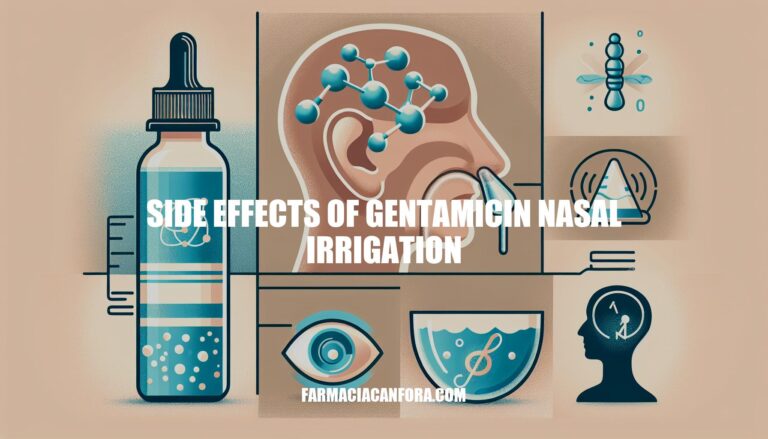


Gentamicin nasal irrigation is a treatment used to manage sinus infections by rinsing the sinuses with a solution containing the antibiotic gentamicin. This method helps to directly target and reduce bacterial infections in the nasal passages. However, it’s crucial to be aware of potential side effects, such as local irritation, itching, and more serious issues like otitis media or exacerbation of asthma. Understanding these risks ensures safe and effective use of the treatment.
Gentamicin nasal irrigation can lead to several side effects:
If you have any specific concerns or symptoms, it’s always best to consult with a healthcare professional.
Gentamicin nasal irrigation can lead to several severe side effects:
Ototoxicity: This is a significant risk, potentially causing irreversible hearing loss and balance issues due to damage to the inner ear.
Nephrotoxicity: Gentamicin can cause kidney damage, leading to acute renal failure. This is due to its accumulation in the renal cortex.
Systemic Effects: Although rare, systemic absorption can occur, leading to side effects such as nausea, vomiting, loss of appetite, weight loss, light-headedness, itching, rash, headache, mood changes, and joint pain.
It’s crucial to use gentamicin nasal irrigation under strict medical supervision to mitigate these risks.
Prolonged use of gentamicin nasal irrigation can lead to several potential long-term side effects:
Ototoxicity: Gentamicin is known to cause damage to the inner ear, leading to hearing loss, tinnitus, and balance issues. This damage is often irreversible.
Nephrotoxicity: Prolonged use can harm the kidneys, potentially leading to kidney failure. This risk is higher in individuals with pre-existing kidney conditions.
Neurotoxicity: Gentamicin can affect the nervous system, causing symptoms such as numbness, tingling, and muscle twitching.
Nasal Irritation: Long-term use may cause chronic irritation and inflammation of the nasal passages.
Systemic Absorption: Although nasal irrigation is localized, there is a risk of systemic absorption, which can lead to broader side effects affecting various organs.
Allergic Reactions: Prolonged exposure can increase the risk of developing allergic reactions, including dermatitis.
Monitoring by a healthcare professional is crucial to mitigate these risks. If you have any concerns, it’s best to consult with your doctor.
Here are some strategies for managing and mitigating the side effects of gentamicin nasal irrigation:
If you have any concerns or questions about your treatment, it’s always best to consult your healthcare provider. They can provide personalized advice based on your specific situation.
Gentamicin nasal irrigation can cause various side effects, ranging from mild to severe.
These may include:
Systemic effects can also occur, including:
In addition to these side effects, long-term risks associated with gentamicin nasal irrigation include:
It is crucial to use this treatment under strict medical supervision and follow proper usage tips, such as:
Monitoring symptoms and avoiding overuse are also essential.
If persistent or severe side effects occur, it is vital to seek immediate medical attention.